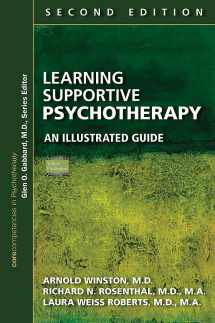
Learning Supportive Psychotherapy: An Illustrated Guide (Corecompetencies in Psychotherapy)
Book details
Summary
Description
The domain of supportive psychotherapy has expanded in recent years, reflecting changes in how psychotherapy is conducted and the role psychotherapy plays in caring for individuals facing difficult life experiences or living with diverse mental and physical disorders. This new, thoroughly revised and up-to-date edition of Learning Supportive Psychotherapy: An Illustrated Guide (first published as Introduction to Supportive Psychotherapy) instructs beginning psychotherapists in the fundamentals of this treatment modality, which focuses on patients' overall health and well-being and their ability to adapt constructively to their life circumstances.
The linchpin of supportive psychotherapy -- and, indeed, all psychotherapy -- is the establishment of a true therapeutic alliance. Accordingly, the authors provide readers with skills aimed at instilling trust and establishing a productive therapeutic relationship, including techniques for alliance building, enhancing ego functioning, and reducing and preventing anxiety. In addition, the authors explore the general framework of supportive psychotherapy, including indications, phases of treatment, initiation and termination of sessions, and professional boundaries; explain how to perform a thorough patient evaluation and case formulation; and describe the process of setting realistic goals with the patient.
The following features and areas of focus enhance the book's utility: Integral to the text's practical approach are the video case vignettes that accompany several of the chapters. These videos model effective psychotherapeutic techniques and strategies, which readers can incorporate into their skill sets. The chapter on crisis intervention has been thoroughly revised to integrate recent research findings on posttraumatic stress disorder, suicide, and critical incident stress management, and the illustrative multipart case vignette provides a therapeutic narrative that is compelling, relatable, and instructive. The material on the therapeutic alliance focuses on skill building, including how to anticipate and avoid disruption in treatment, how to discuss the therapeutic relationship with the patient, how to modify distorted perceptions using clarification and confrontation, how to deal with negative transference and therapeutic impasses, and how to reframe statements in a supportive manner. Outcome research receives its own chapter, in which the authors review the robust evidence base for the efficacy of supportive psychotherapy, including a number of outcome trials, bolstering the necessity of learning the techniques outlined in the book. The book concludes with 75 questions and answers to test the reader's comprehension and identify areas for further study.
This new edition of Learning Supportive Psychotherapy: An Illustrated Guide builds on the well-earned reputation of previous editions. Beginning clinicians first learning the techniques of psychotherapy and veterans who must assess competence in the psychiatry residents they supervise will find the help they need in this down-to-earth, clinically rich guide.


We would LOVE it if you could help us and other readers by reviewing the book
Book review



